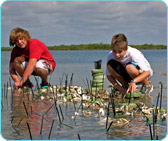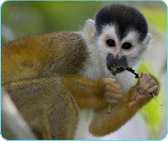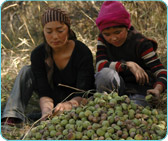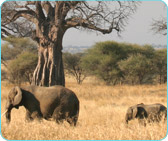Charitable Giving Programs
You've taken the habitat pledges, now connect your actions to the rest of the planet! Check out these global habitat programs and help us choose which should get the most support. Read up and cast your vote!
Organization: The Nature Conservancy
Location: United States
Help stop oyster reefs from disappearing! Oyster reefs are important because they provide shelter for wildlife, promote clean water, and protect the shoreline. A recent study showed that 85 percent of the world’s oyster reefs have already been lost! To save reefs at the Mosquito Lagoon in Florida, we will work with volunteers—including kids like you—to make “oyster mats.” The mats restore the reefs by giving the oysters a new place to grow. We’ll also educate the community about oysters and let them know what they can do to help.
Project: Cerro Osa Forest Restoration
Organization: Natural Resources Defense Council
The Osa Peninsula, located on Costa Rica's southern Pacific coast, is one of the wildest places left in the world. It is home to half of Costa Rica’s 500,000 animal and plant species, including many that do not exist anywhere else. The Osa is a critical place for saving animals like the jaguar, squirrel monkey, and peregrine falcon. Unfortunately, this special area is being threatened by expansion of agriculture and other activities. The Natural Resources Defense Council will work with a local group, Friends of the Osa, to plant thousands of local trees and plants to restore 50 acres of forest land. The revived rainforest will once more be the home of unique wildlife and will offer local students a living laboratory to learn about protecting natural resources.
Project: Forest Fruits for the Future
Organization: Fauna and Flora International
Many people living in the countries of Kyrgyzstan and Tajikistan depend on their forests for survival - fruits and nuts for food to eat, wood for fires and other natural resources to earn an income. Almost all of the people in these communities use the forest with limited knowledge of their impact. This has led to a 90 percent decrease in the size of the fruit and nut forests in Central Asia. Fauna & Flora International's project will educate local community members, kids and young people specifically, through positive and fun activities to increase awareness about the implications of using these precious forests so frequently. With kids help the project will establish eco-youth clubs, tree nurseries and also create conservation plays, poems and dances to change attitudes and behaviour about sustainable forest use.
Project: Protecting Indonesia's Tesso Nilo's Habitat
Organization: World Wildlife Fund
Sumatra is the only place in the world where elephants, tigers, rhinos and orangutans live together in the same habitat. In 2004 World Wildlife Fund (WWF) helped create Tesso Nilo National Park on the island of Sumatra as a safe zone for tigers and elephants. WWF will work with the local community to protect this habitat by training local people to patrol the ground-keeping away poachers and minimizing human/animal conflict and will also work to empower local children to care for their wildlife and environment by teaching them how to conserve their resources through several fun, hands-on initiatives.
Project: Communities Give Elephants Room to Roam
Organization: African Wildlife Foundation
Elephants are one of the most far-wandering species in all of Africa, traveling great distances in search of food and water. They are very smart and social animals that live in large families and watch closely over one another. Sadly, elephants are often attacked by poachers for their ivory tusks. They are also in trouble because the lands they live on and the paths they travel on are being destroyed. The African Wildlife Foundation (AWF) is working in Zambia to protect the habitats that elephants depend on and the pathways they travel. It is not only elephants that need help though. There are many poor people who live in this area. For that reason, AWF and local villages have agreed to help both elephants and people by protecting a critical elephant path and improving opportunities for local children to go to school.














